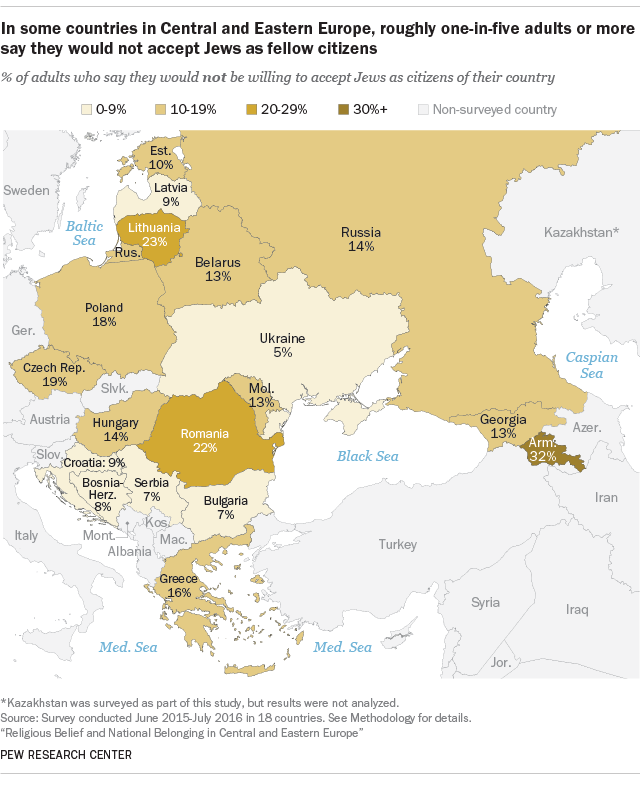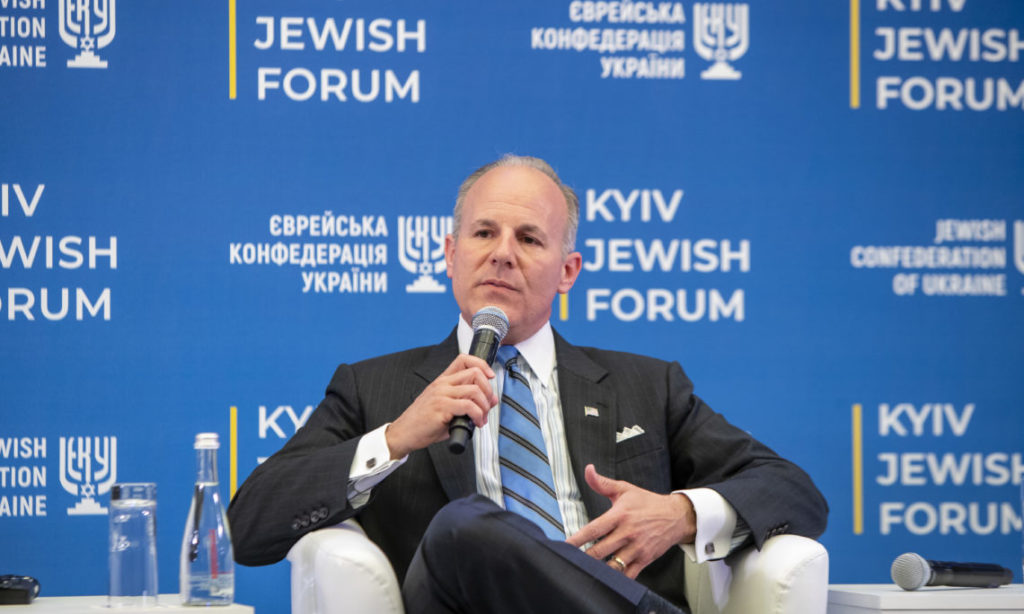
Kyiv Jewish Forum
Russia is treating Ukraine and its newly elected president, Volodymyr Zelensky, with the same implacable hostility as it did during Petro Poroshenko’s presidency, according to a leading analyst.
The Kremlin is “confronting the new Ukrainian president—and, soon, a new government—with the dilemma of either protecting Ukraine’s sovereignty and refusing to negotiate on such a basis, or, alternatively, facing a protracted military stalemate and forfeiting the occupied territories,” notes the Jamestown Foundation’s Vladimir Socor. “Either course of action would saddle the new Ukrainian president and government with heavy domestic and international costs.”
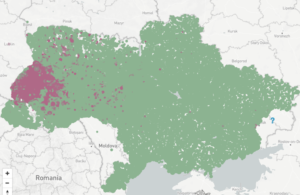
Dekoder.org
In order to influence Ukraine’s forthcoming parliamentary election campaign, Moscow aims “to draw a deep wedge between the president’s Servant of the People (which will contest the parliamentary elections) and the voters in Ukraine’s east and south,” he adds. “The Kremlin’s goal in these elections is for this party to exploit the political fragmentation of the new Ukrainian parliament, bargain its way into a governing coalition and influence it from within.”
It was “stunning and unprecedented” that the Jewish identity of Ukraine’s newly elected president played no role in the elections and that Ukraine is the only country other than Israel to have both a Jewish President and a Jewish Prime Minister, said Elan Carr (above), the US Special Envoy to Monitor and Combat Anti-Semitism.
“And it is nothing short of stunning that in any country in the world, certainly in a country in Europe, given the history here, given the history of eastern Europe, that a candidate would never have his Jewishness raised as an issue in the campaign,” he told a panel on Combating Anti-Semitism at the Kyiv Jewish Forum. “By the way, I don’t even know if that would happen in the United States.”
Edouard Dolinsky, head of the Ukrainian Jewish Committee, is less impressed by these claims, The Jerusalem Post reports:
Zelensky’s Jewish heritage was not well known in Ukraine, and his appeal and name-recognition had been from his TV persona in the successful series he acted in, Servant of the People, and the fact that he was not part of the political and business elite.
“Most of the votes Zelensky got were against Poroshenko,” argued Dolinsky, arguing that the attraction of the president-elect was mostly his anti-establishment status. “Ukrainians weren’t voting for a Jew, they were voting for change, against corruption, something new and someone not from political elites.”
The election was “emblematic of Ukraine’s extraordinary progress as a democracy,” said Carl Gershman, President of the National Endowment for Democracy, @NEDemocracy #kyivjewishforum
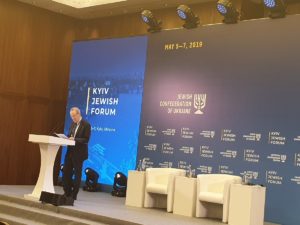
Kyiv Jewish Forum/Twitter
Zelensky’s landslide victory of was “extraordinary on so many different levels, leading him famously and appropriately to declare: ‘To the countries of the former Soviet Union: look at us, everything is possible.” The fact that Zelensky’s Jewish background played “zero role” in the election, according to Igor Shchupak, an historian of the Holocaust from Dnipro, was an unintended yet still stinging rebuke to Putin,” Gershman told the forum (right), organized by Boris Lozhkin, President of the Jewish Confederation of Ukraine.
Anti-Jewish attitudes in Ukraine are among the lowest in the region, according to a recent Pew survey, he noted. “No one could have predicted such progress.”
Some 5 per cent of respondents told Pew researchers they “would not accept Jews as citizens of their country”. That compares with 32 per cent of Armenians, 22 per cent of Romanians and 14 per cent of Russians (see below).
‘Democracy taking hold’
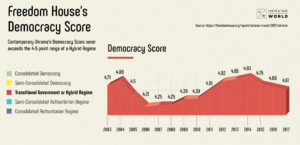 “Along with Belarus, Ukraine suffered the most from the Nazi occupation and atrocities . . . In addition to about 2m Jews from Ukraine’s territory who died in the Holocaust, about 5m Ukrainians died at the hands of the Nazis,” said Adrian Karatnycky, co-director of the Ukrainian Jewish Encounter. “This legacy is remembered by the vast majority of Ukrainian families, and is, perhaps the main reason why there is little tolerance for anti-Semitism today,” he told the Financial Times.
“Along with Belarus, Ukraine suffered the most from the Nazi occupation and atrocities . . . In addition to about 2m Jews from Ukraine’s territory who died in the Holocaust, about 5m Ukrainians died at the hands of the Nazis,” said Adrian Karatnycky, co-director of the Ukrainian Jewish Encounter. “This legacy is remembered by the vast majority of Ukrainian families, and is, perhaps the main reason why there is little tolerance for anti-Semitism today,” he told the Financial Times.
With “democracy taking hold”, said Yaakov Bleich, chief rabbi of Ukraine. “Ukraine is maturing, the population is becoming more tolerant, respectful.”
Gershman reminded the audience that following the Maidan protests, Russian President Vladimir Putin “launched a vicious smear campaign, charging that the revolution was no more than a ‘rampage of reactionary, nationalist, and anti-Semitic forces,’ only to be rebutted in an open letter from a group of over two dozen “Jewish citizens of Ukraine,” charging him with spreading “lies and slander.” Even the most marginal of the nationalist groups, they said, “do not dare show anti-Semitism” because they are “well-controlled by civil society and the new Ukrainian government – which is more than can be said for the Russian neo-Nazis who are encouraged by your security services.”
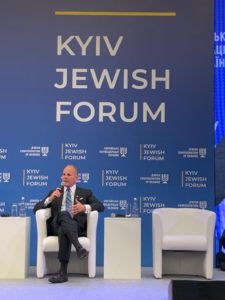
Kyiv Jewish Forum
Indeed, this week Israel criticized an article authored by a close adviser to Putin, which claimed that Ukraine’s president may want to move Israeli Jews into parts of his country, as “conspiratorial and anti-Semitic,” The Times of Israel reports:
In the lengthy article posted on the nationalist blog Zavtra (Tomorrow) and on his personal website, Sergey Glazyev describes new Ukrainian President Volodymyr Zelensky, who is Jewish, as a puppet of the US administration, which is doing the bidding of the Israeli right.
“I don’t rule out, for example, the possibility of a mass movement into southeast Ukrainian land ‘cleansed’ of the Russian population by the inhabitants of the Promised Land tired of permanent war in the Middle East,” Glazyev wrote.
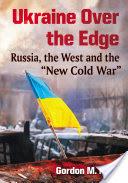 Putin signed a decree late last month to expedite the process of applying for Russian citizenship for people living in separatist regions of eastern Ukraine, World Politics Review adds. The decree poses challenges for Zelensky’s agenda and could exacerbate divisions, says Gordon Hahn, a senior researcher at the Center for Terrorism and Intelligence Studies and the author of “Ukraine Over the Edge: Russia, the West and the ‘New Cold War.’”
Putin signed a decree late last month to expedite the process of applying for Russian citizenship for people living in separatist regions of eastern Ukraine, World Politics Review adds. The decree poses challenges for Zelensky’s agenda and could exacerbate divisions, says Gordon Hahn, a senior researcher at the Center for Terrorism and Intelligence Studies and the author of “Ukraine Over the Edge: Russia, the West and the ‘New Cold War.’”
Ukraine is a testing ground for democratic reforms for the whole region, says Orysia Lutsevych, Ukraine Forum Research Fellow and Manager with the Chatham House Russia and Eurasia Program. If Ukraine succeeds in building a fair and effective system that delivers prosperity and security, it will be a powerful magnet for regional growth, an inspiration for others, and a powerful deterrent for Russia, she writes for the World Economic Forum. Several factors will determine the success of Zelensky’s presidency, including:
- Zelensky needs to deliver a modernization agenda that allows his voters to feel the economic gains of reforms. Rule of law is an underpinning reform that has barely started in Ukraine.
- If Zelensky manages to re-boot Ukraine’s new anti-corruption agencies and reform the Prosecutor’s General Office, it could create a new quality of judiciary. With better protection of property rights and fair trials, investors will up their stakes in Ukraine.
- Equally crucial for his success is opening the economy to competition with effective anti-trust laws. Currently, 60% of Ukraine’s markets are non-competitive.
- Finally, in order to deliver on economic promises and the rule of law, Zelensky needs strong representation in parliament and a prime minister supportive of his policies.
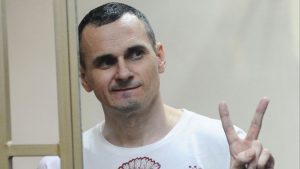
PEN America
On May 10, five years will have passed since Ukrainian filmmaker and writer Oleg Sentsov (right) was arrested in Crimea for allegedly “plotting terrorist acts” following the Russian annexation of the territory where he lived, PEN America adds. In February 2017, Sentsov was awarded the annual PEN/Barbey Freedom to Write Award for his commitment to freedom of expression.
Ukraine is proving to be a laboratory for the arduous task of building sustainable democratic institutions, according to Stanford University’s Francis Fukuyama.
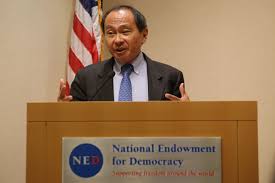 “The impact one can have on building institutions like the modern state, the rule of law, and democracy is limited. The area where it’s easiest is the third category, building democracy,” he argues. “The first two, building the modern state and building a real rule of law, are much harder, and those are the areas that have been the real obstacles to the modernization of the political systems of many countries, including Ukraine,” Fukuyama (left) told the Atlantic Council.
“The impact one can have on building institutions like the modern state, the rule of law, and democracy is limited. The area where it’s easiest is the third category, building democracy,” he argues. “The first two, building the modern state and building a real rule of law, are much harder, and those are the areas that have been the real obstacles to the modernization of the political systems of many countries, including Ukraine,” Fukuyama (left) told the Atlantic Council.
Ukraine has one of the lowest levels of anti-Semitism in Central and Eastern Europe as a result of a shift in attitudes the country has witnessed over the last two decades, Associated Press adds. Consequently, the forum considered lessons that Ukraine can offer, ways for Jewish communities to learn from each other and to generate innovative solutions to counter the renewed wave of anti-Semitism.
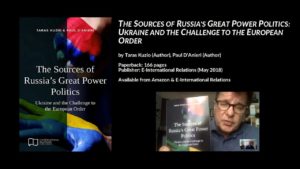 The NED’s Gershman called on the Ukrainian authorities to address the legacy of the Holocaust, stating that memorializing the past is integral to the forging of a common national identity. He endorsed five recommendations from Aleksandra Wroblewska, the coordinator of the Protecting Memory project:
The NED’s Gershman called on the Ukrainian authorities to address the legacy of the Holocaust, stating that memorializing the past is integral to the forging of a common national identity. He endorsed five recommendations from Aleksandra Wroblewska, the coordinator of the Protecting Memory project:
- A history of the Holocaust for every village and town where the Jewish population was annihilated should be compiled and made available to the local communities;
- Schools should establish long-term educational programs linked to the protection of the sites, and local teachers and leaders should be educated, supported, and put in a position to define their needs and goals;
- The Ministry of Culture should take the sites under active protection and regulate the juridical questions related to land-use; this should be done as soon as possible, before the land is offered to private investors;
- Criminal proceedings should be initiated against those who are destroying gravesites, which unfortunately is not uncommon;
- And an institution should be established to coordinate these and other actions, possibly in cooperation with institutions in supporting countries.

Kyiv Jewish Forum
Ukraine’s Prosecutor General Yuriy Lutsenko said he was “proud that Ukraine has the lowest level of anti-Semitism throughout Eastern and Central Europe, and I think in Europe as a whole,” but cautioned against right-wing extremism.
“All paramilitary formations must be brought into the framework of the law and not allow any anti-national manifestations,” he told the Kyiv Jewish Forum.
“During the last year, not a single attack on the grounds of anti-Semitism happened in Ukraine,” Interior Minister Arsen Avakov added.
 The U.S. Holocaust Memorial Museum is alarmed by a resurgence of dangerous and deadly antisemitism, which is not only a global threat, but a national one. We have clearly entered a new era, but we can each take action by unequivocally condemning antisemitism wherever it appears. The Holocaust is a reminder of the way hate can infect a society and the dangers of indifference. Taking the lessons of this history to as many people as possible is more urgent than ever. Follow the Museum on Instagram and Facebook to learn more about antisemitism and share with your networks. #LearnTheHistory
The U.S. Holocaust Memorial Museum is alarmed by a resurgence of dangerous and deadly antisemitism, which is not only a global threat, but a national one. We have clearly entered a new era, but we can each take action by unequivocally condemning antisemitism wherever it appears. The Holocaust is a reminder of the way hate can infect a society and the dangers of indifference. Taking the lessons of this history to as many people as possible is more urgent than ever. Follow the Museum on Instagram and Facebook to learn more about antisemitism and share with your networks. #LearnTheHistory
